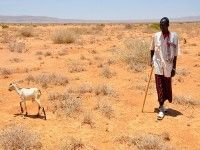Extreme drought, climate change and security in Somalia
At a UN Security Council debate on the links between global security and climate change on Wednesday (20 July), UN Secretary General Ban-Ki Moon spelled out devastating possibilities that climate change could have on global security


Global security is being threatened by climate change and resulting natural disasters, such as the drought afflicting Somalia, according to the UN chief.
At a UN Security Council debate on the links between global security and climate change on Wednesday (20 July), UN Secretary General Ban-Ki Moon spelled out the risks associated with rising temperatures worldwide. He said: “Extreme weather events continue to grow more frequent and intense in rich and poor countries alike, not only devastating lives, but also infrastructure, institutions, and budgets.”
Somalia is currently experiencing one of its worst droughts for 60 years. On Wednesday the UN declared that the country was in a state of famine, as around 3.7 million Somalis face a food crisis.
At the UN Security Council debate, UN Under-Secretary-General and UNEP Executive Director, Achim Steiner described findings from the Intergovernmental Panel on Climate Change (IPCC). The fourth assessment report from the IPCC in 2007 is based on the research of thousands of scientists worldwide and concluded that it was "unequivocal" that the Earth is warming and that human activities play a role in this change.
Mr Steiner said: “Among its many findings was that 11 of the last 12 years rank among the 12 hottest years on record.”
"There is a linear warming trend over the last 50 years of, on average 0.13°C per decade”.
Yesterday (Thursday 21 July), John Vidal wrote about the increase in extreme droughts in Somalia on the Guardian website. He said: “They started having droughts every seven years; in the 1980s they came about every five years and in the 1990s every two or three. Since 2000 there have been three major droughts and several dry spells”.
International aid and donor agencies have been dispatching provisions to the area and calling for more money to be spent but Kevin Cleaver, Associate Vice President of IFAD suggests that more can be done by governments and business in the interim period between extreme events to help developing countries. He said: “Although governments and their development partners cannot make the rains come, they can mitigate the impact of these recurring droughts in East Africa by helping farmers and herders build resilience to these inevitable meteorological occurrences.”
“Much greater investment in agricultural research, an area long neglected by both governments and donors, is essential to develop and diffuse drought and disease-resistant food and fodder crops which are better able to withstand moisture stress.”
However, political instability in Somalia and ongoing conflict makes it difficult for government or businesses to invest and develop this industry. Somalia has been without an effective and authoritative central government since President Siad Barre was overthrown in 1991. Civil war, worsening and more frequent cases of famine and disease have left the country unattractive and difficult for investments to make a difference to the lives of Somalians.
In an interview with Reuters on Friday (22 July) Kanayo Nwanze, director of the International Fund for Agricultural Development (IFAD) said: "This is a huge humanitarian crisis compounded by both manmade and natural disasters."
“The case of Somalia is very sad [...] to invest in a country where there is political instability is practically impossible.”
Image: Oxfam East Africa | Flikr





